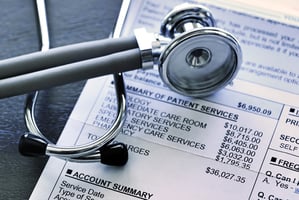Running a private practice already demands enough from you. Adding hours of administrative work on...

With the rise of the digital era and almost everyone being able to share their opinion with just a few clicks - it’s important to keep up with your online reputation and to know how to respond to the good, the bad, and even the ugly.
Whether you check your online reviews daily or haven’t even Googled your medical practice, you can be sure both prospective and current patients are reading what others are saying about their experience at your facility.
If you have a bad online review haunting your medical practice, check out these helpful tips:
When someone is making a defamatory comment about your medical practice it’s a knee-jerk reaction to want to defend what you’ve worked so hard to create. When you try to run your business as best you can it can feel like an attack when someone makes an unfounded claim.
It’s best to take some time to cool down after reading a negative review and come up with a plan to resolve the issue with the patient offline. Avoid responding in anger. No physician wants to be known for losing control of their emotions over a computer screen. You’d rather your private medical practice go viral for providing unbeatable care, not battling with patients online.
Sometimes the “if you don’t have anything nice to say then don’t say it all” might be your go-to option. But ignoring negative reviews can be a missed opportunity for you to show how much you prioritize your patients and their experiences at your medical practice.
Ignoring a negative review can give the impression that you don’t care enough about your clients or whether they had a bad experience. You want your medical practice to be known for caring about customer service and how your patients are treated in both the waiting room and the exam room. Respond, but keep it brief. You want to acknowledge receipt of the review and provide a way to communicate with the patient further. Discussion about specific concerns should be taken offline, as HIPAA-compliant responses are more important now than ever.
After a keyboard warrior leaves a nasty review you may want to jump into damage control mode and ask for positive feedback in an attempt to cover up the poor comments about your private practice.
The best reviews for your medical practice are organic, those submitted by patients who naturally sing your praises and share their experiences. Pulling teeth to get positive reviews can result in inauthentic niceties that, when mixed in with negative reviews, can give prospective patients the impression that something is not quite right at your practice.
In a nutshell: your online reputation matters, and protecting it should be a priority. You want to give special attention to positive reviews, but be sure to shed a spotlight on any negative feedback so people see you delicately tending to those who did not have the best experience. A bad review can turn into a positive review if responded to in the right way.
Usually, when patients are sounding off about a less than stellar experience it’s because they want to be heard. By acknowledging that you’re letting the patient know you care about them and their experience at your medical practice. Remember, it’s crucial that when responding to comments about your medical practice that you adhere to HIPAA regulations at all times to avoid any potential legal troubles.
Wanting more tips on healthcare marketing, check our list of 10 healthcare marketing trends to have on your practice's radar


Running a private practice already demands enough from you. Adding hours of administrative work on...

Running a medical practice involves managing dozens of ongoing costs, and understanding them is...

A Texas physician opened a new practice with everything in place – staff hired, patients scheduled,...

Your biller is three weeks behind on claims. Two no-shows went unfilled this morning. Your office...

Every minute spent chasing paperwork or fixing scheduling issues is time taken away from patients....

Most physicians didn’t go through years of training to become billing experts, HR managers, or IT...

If your medical practice overhead seems to be eating into your revenue, you’re not alone. Research...

Marketing and referral strategies are part of running a private practice. In Texas, they come with...
.jpeg?height=200&name=alone-bills-calculator-1253591%20(1).jpeg)
Opening a medical clinic is rewarding – but it comes with upfront costs. Lease deposits. Equipment....

Ending a relationship with a patient isn’t something providers take lightly. But when certain...
Leave a Comment